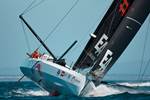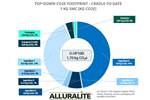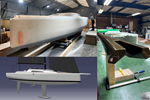11th Hour Racing sponsors IMOCA to advance competitive sailing diversity, sustainability
Additional support will be provided for IMOCA projects related to building with alternative material sources, a carbon fiber recycling pilot project, increasing opportunities for female sailors and more.
The International Monohull Open Class Association (IMOCA) and offshore sailing racing team 11th Hour Racing are joining forces to drive sustainable innovation and support opportunities for female sailors within competitive sailing. The partnership will help promote and develop a series of seven programs that the IMOCA Class has been working on over the last 4 years targeting these main objectives.
These efforts focus on reducing the marine industry’s environmental impact by collaborating with boatbuilders and material experts to source alternative materials (such as flax or recycled carbon fiber), empowering the next generation of female leaders in sailing in partnership with The Magenta Project and developing solutions to mitigate collisions between racing yachts and marine mammals in offshore races. With 11th Hour Racing’s support, IMOCA’s ambition is to expand the dynamics of its collaborative projects, particularly within the maritime industry.
“I can’t think of a better organization than 11th Hour Racing for us to work with, given their established track record on environmental projects, on inclusion and on efforts to preserve the oceans and the creatures that live in it,” says Antoine Mermod, the president of the IMOCA Class. The two organizations have history working together during The Ocean Race from 2022-2023.
IMOCA is a class of skippers and teams, where each member votes to endorse new rules at the Annual General Meeting of the Class in Lorient, Brittany, France. For example, the Green Sail rule — defined as a sail crafted to reduce emissions by 30% per kilogram compared to standard sails — requires every participating IMOCA to carry at least one Green Sail in its onboard sail inventory. This year, the class introduced a new regulation for all new IMOCA boat builds between 2025 and 2028 to reduce harmful emissions by 15% — or approximately 60 metric tons of CO2 (60tCO2e).
As part of some of its other projects being supported by 11th Hour Racing, the IMOCA Class is expanding its onboard science program, collaborating with scientific partners such as the Intergovernmental Oceanographic Commission of UNESCO since 2015. By the end of 2024, this program aims to equip at least half of the IMOCA fleet with scientific instruments to monitor oceanic CO2 levels, microplastic pollution distribution and meteorological data that enhances weather models.
IMOCA will also oversee Lorient’s carbon fiber recycling pilot project, managing its expansion, diversification, and implementation, focused on boosting the yield of recycled materials year over year.
Related Content
-
Natural fiber composites: Growing to fit sustainability needs
Led by global and industry-wide sustainability goals, commercial interest in flax and hemp fiber-reinforced composites grows into higher-performance, higher-volume applications.
-
Cryo-compressed hydrogen, the best solution for storage and refueling stations?
Cryomotive’s CRYOGAS solution claims the highest storage density, lowest refueling cost and widest operating range without H2 losses while using one-fifth the carbon fiber required in compressed gas tanks.
-
Plant tour: Joby Aviation, Marina, Calif., U.S.
As the advanced air mobility market begins to take shape, market leader Joby Aviation works to industrialize composites manufacturing for its first-generation, composites-intensive, all-electric air taxi.

















